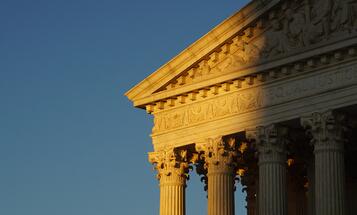
Judge Gorsuch’s Evasiveness on Money In Politics Makes Him Unfit To Serve On The Supreme Court
Gorsuch's record suggests that he will side with big money over working families.
At last week’s four-day long hearing before the Senate Judiciary Committee, Donald Trump’s pick for the Supreme Court, Neil Gorsuch, refused to answer even the most basic questions about the role of money in our democracy.
Judge Gorsuch has a record of going out of his way to support the wealthy and powerful over every day working people. And, with the potential to be the deciding vote to do away with the few remaining protections against big money influence in our democracy, the stakes could not be higher. Judge Gorsuch would make racial bias in political voice in this country even worse—by further empowering the wealthy, white donor class over the rest of the population.
The burden was on him to show that he respects core constitutional values like equal justice for all and would protect all of our rights, not just the rights of the wealthy and well connected. Judge Gorsuch did no such thing.
Here’s a round-up of the most egregious moments of the hearing when Judge Gorsuch failed to offer straightforward answers about his views on money in politics.
1. On billionaires being able to buy our democracy
When Senator Whitehouse (RI) asked him, essentially, if Congress had the power to address the possibility that an elite donor class will completely take over our democracy, Judge Gorsuch’s response suggested that Congress can legislate to address bribes to politicians.
But, we know that a total takeover by a political elite would run much deeper, and would be more systemic, than bribes to politicians.
Gorsuch refused to state that millionaire and billionaire spending was pernicious in our democracy.
2. Refusing to acknowledge that vote buying is problematic
When asked by Senator Leahy (VT) whether someone outright purchasing a vote would qualify as corruption, Gorsuch declined to answer. When pressed further by Leahy, Gorsuch replied, “I’d follow the law…and that would certainly follow within my understanding of the law.”
By refusing to answer even this basic question about vote-buying, Judge Gorusch refused to acknowledge that it’s unfair for the wealthy to have more of say in our democracy than every day Americans.
3. Pretending to not understand Citizens United
When Senator Leahy asked him about Congress’ role in legislating to limit corruption in the wake of Citizens United, Gorsuch responded by saying, “I think there is lots of room for legislation in this area that the Court has left. The Court indicated that if proof of corruption can be demonstrated that a different result may obtain on expenditure limits….”
Gorsuch’s answer raises serious concerns about his grasp of Citizens United. As Rick Hasen notes, "Either Judge Gorsuch does not understand the scope of Citizens United and its holding, or he is trying to soften its harshness by wrongly suggesting Congress has room to legislate spending limits."
Nothing in Judge Gorsuch’s record suggests he would want to soften Citizens United’s blow to our democracy—in fact, he signed on to extend its logic in the Hobby Lobby case. But if Judge Gorsuch believes that legislators or litigants can present evidence of corruption that could justify a spending limit, he should tell us what kind of evidence he has in mind—as Senator Leahy has requested in follow up “questions for the record.”
4. On giving donors the highest possible constitutional protection
In the Riddle v. Hickenlooper case, the Tenth Circuit struck down a Colorado statute that allowed higher contribution limits for major party candidates than for minor party candidates. In that opinion, Judge Gorsuch went out of his way to write a concurring opinion suggesting that he might join the most conservative Supreme Court justices and afford contribution limits the “strict scrutiny,” the most stringent standard of judicial review used by the courts and highest constitutional protection. The application of strict scrutiny in this instance would be extreme. As Demos counsel Allie Boldt has pointed out, in some instances “the Court has not even afforded the freedom to vote with this level of protection.”
When Senator Klobuchar (MN) asked Gorsuch why he went out of his way to write the concurrence, he simply mansplained the case to her. He refused to say whether he thinks all contribution limits should be subject to strict scrutiny—a radical interpretation that would put him among the ranks of Justices Thomas and Scalia, and that would put many of our remaining campaign finance protections at risk. Judge Gorsuch’s answers also gave no indication whether he would treat a contribution limit or ban that applied differently to corporations than to real people as “discriminatory”—as his vote with the majority in Hobby Lobby warns he might. The system is fundamentally broken when the right to contribute or spend money is protected with more force than the right to vote. That is literally putting money over people.
5. Refusing to state that disclosure is in the public’s interest
Senator Whitehouse cited Gorsuch’s own nomination as an example of the role of secret spending to influence political outcomes, and he pressed Trump’s nominee about what he thought of a group spending $10 million to support his nomination.
Not surprisingly, Gorsuch refused to say whether he thinks disclosure is in the public interest, asserting instead that “It would be a politics question and I’m not, with all respect Senator, going to get involved in politics.”
While Gorsuch talked about the importance of protecting speech, he never quite articulated the positive value of disclosure. Nina Totenberg and Rick Hasen posit that Gorsuch seems to the right of Scalia on the issue of disclosure and would side with extremist justices who refuse to recognize a strong public interest in knowing who seeks to influence our votes.
Conclusion
Ninety-one percent of people who voted for President Trump’s wanted him to appoint someone to the Supreme Court who is open to limiting big money. Gorsuch, simply put, is not up to the job. His record suggests that he will side with big money over working families. Next week, Senators must oppose his nomination to a lifetime appointment on the highest Court.



